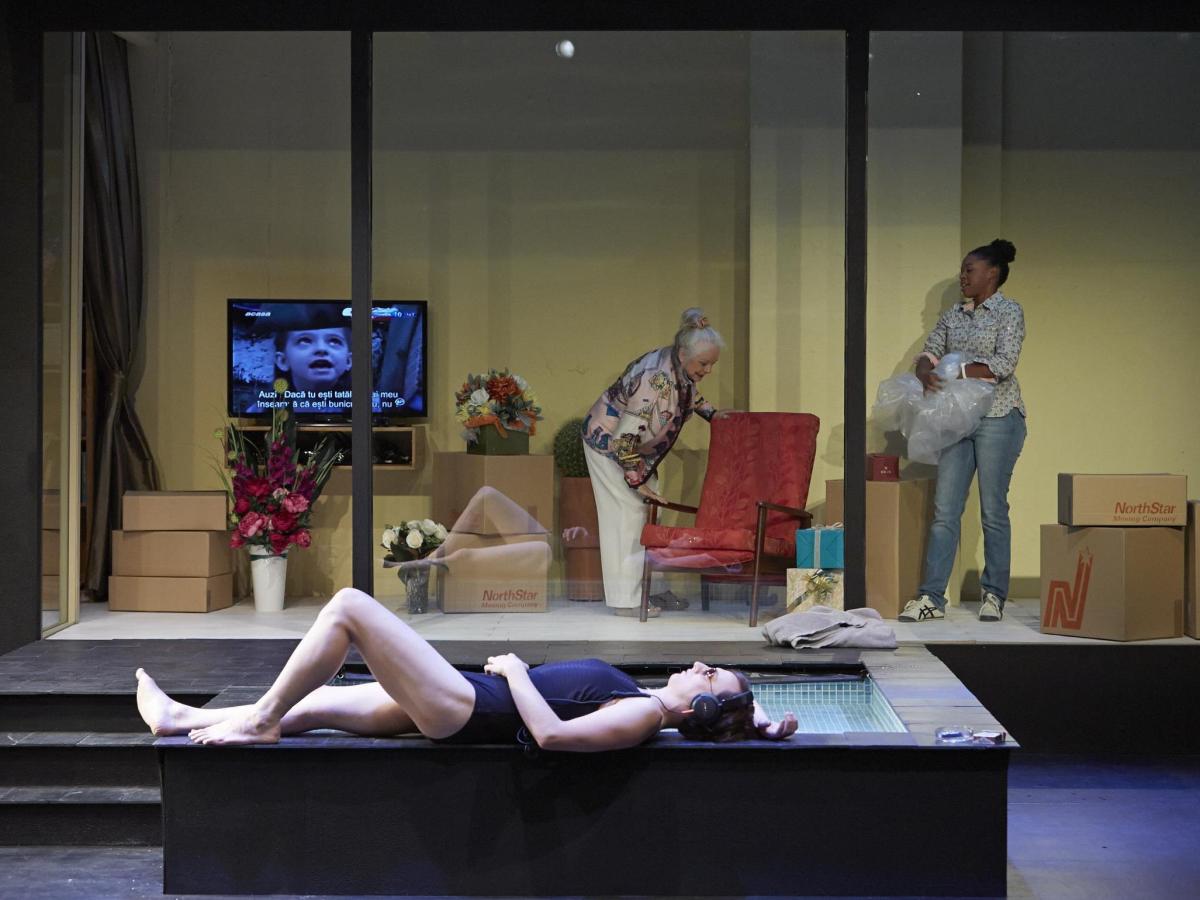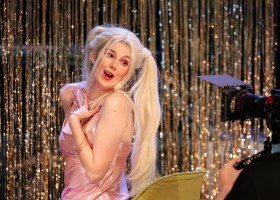Ash Flanders, Lynette Curran and Branden Christine. Image by Ellis Parrinder.
Henrik Ibsen’s seminal work, Hedda Gabler, chronicles the demise of a woman whose soul is crushed by conformity. Hedda is largely regarded as one of the great female roles in theatre. With precious few great leads available to female actors, director Adena Jacob’s decision to cast a man (Ash Flanders) in the role of Hedda was bound to ruffle a few feathers. In one fell swoop, Jacob simultaneously remastered a classic and alienated a subsection of women who championed Hedda as a tragic heroine.
Ash Flanders is one half of the Melbourne-based queer theatre company Sisters Grimm. Flanders’ Hedda is steely cold, disengaged and disengaging. He doesn’t just take the woman out of Hedda – he takes the Hedda out of her as well. You’d think this would give us a kind of generic ‘everyman’, but what replaces the woman is not quite man either. On this empty vessel, the audience inscribes whatever experience of subjugation befits their personal experience – racial, sexual or socio-economic. This is a revelation – for the first time I am able to directly experience the themes of power and subjugation of Hedda Gabler in their raw, pure form, in terms of my own personal experience and not overshadowed by the bombastic nature of the title character. This production has not so much given new meaning to the work, as it has simply allowed a space for meanings to arise outside of the traditional feminist reading. Now, we have the space to reflect on the subjugation of the black maid Berte, the manipulation of financially poor Thea, and the neutering of Lovborg’s genius.
To draw such a loose freehand of this play is not without drawbacks, and the main failing here is an over-reliance on audience to synthesize meaning, in lieu of the dramatists creating it. A mish-mash of confronting and confusing imagery within the structure of a classic proves too much to overcome. Furthermore, it relies heavily on the audience’s first-hand experience with subjugation, and although most people are victims of subjugation, they are also acutely unaware of it. Plays like Hedda Gabler would not exist if this weren’t true.
The most overt takeaway from this transgendered Hedda is the parallel drawn between Hedda and the journey of a transsexual. This includes the concept of buying into a lifestyle, but never fully owning it and desiring to be something else, but never quite achieving it. Hedda dons a luxurious auburn wig, but promptly removes it – these moments of yearning are hinted at, but not explored in a queer context, and subsequently are lost on a mainstream audience.
Production design and lighting is of a typically high standard and Kelly Ryall’s music is particularly strong. It manages to be mundane, suburban, daggy and creepy all at the same time. The supporting cast is excellent – Marcus Graham as Brack plays up admirably to the homosexual undertones of his ‘triangular’ proposition. Oscar Redding is an enigmatic Lovborg.
It’s great to see Hedda Gabler reworked so ferociously, because it needs to be. Although the themes of oppression and entrapment are still relevant today, Hedda’s journey simply isn’t. While modern women face discrimination, they are nowhere near as enslaved by the marriage structure as 19th century women were, and most modern women would think nothing of calling a divorce lawyer if it is going to save them a bullet in the head. Early productions of Hedda Gabler were not well received; it took audiences a long time to accept Ibsen’s Hedda, so it’s not surprising that they might take as long to accept Jacob’s Hedda either. Sadly, those who lack patience for complicated things are likely to dismiss this production as shallow provocation before that happens.
Rating: 3 ½ out of 5 starsHedda Gabler
Adapted by Adena Jacobs from the play by Henrik Ibsen
Director: Adena Jacobs
Set Designer: Dayna Morrissey
Costume Designer: David Fleischer
Lighting Designer: Danny Pettingill
Composer: Kelly Ryall
Dramaturg: Luisa Hastings Edge
Fight Director: Scott Witt
Stage Manager: Edwina Guinness
Assistant Stage Manager: Angharad Lindley
Cast: Branden Christine, Lynette Curran, Ash Flanders, Marcus Graham, Anna Houston, Oscar Redding, Tim Walter
Belvoir, Belvoir St, Surry Hills
www.belvoir.com.au
28 June – 3 August






